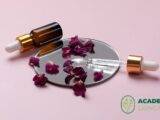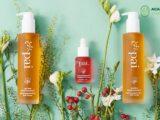Argan vs Jojoba vs Rosehip Oil
Last Updated on November 16, 2023 by user
Another showdown another furious debate, this time with three oils! Argan oil, Jojoba Oil and Rosehip Oil are ancient botanical and medicinal oils that have been used to treat various skin conditions since ages! But if you had to buy only one singular one which one would it be? Read along to disocver who wins the contest – Argan Oil vs Jojoba Oil vs Rosehip Oil!
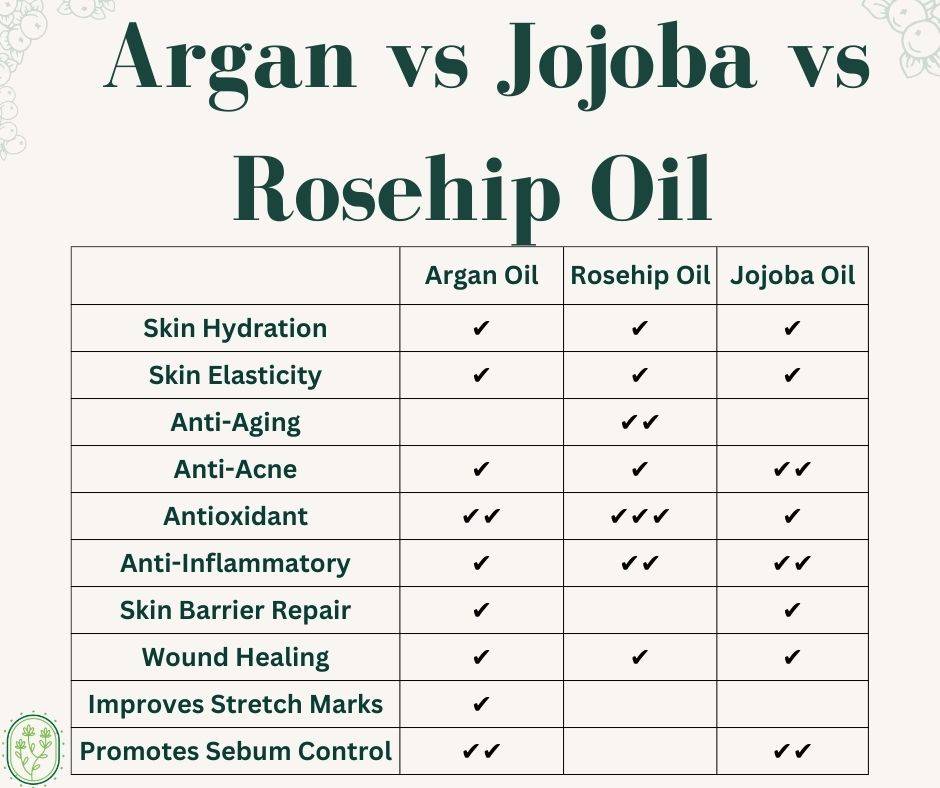
What is Jojoba Oil?
Jojoba oil is an ancient plant harvested from the jojoba plant native to the North American deserts, Mexico and currently also in Egypt.
Jojoba oil has been used by the Native Americans for the treatment of skin conditions but also for systemic diseases like sore throat, urinary tract infection, cancer and cold.
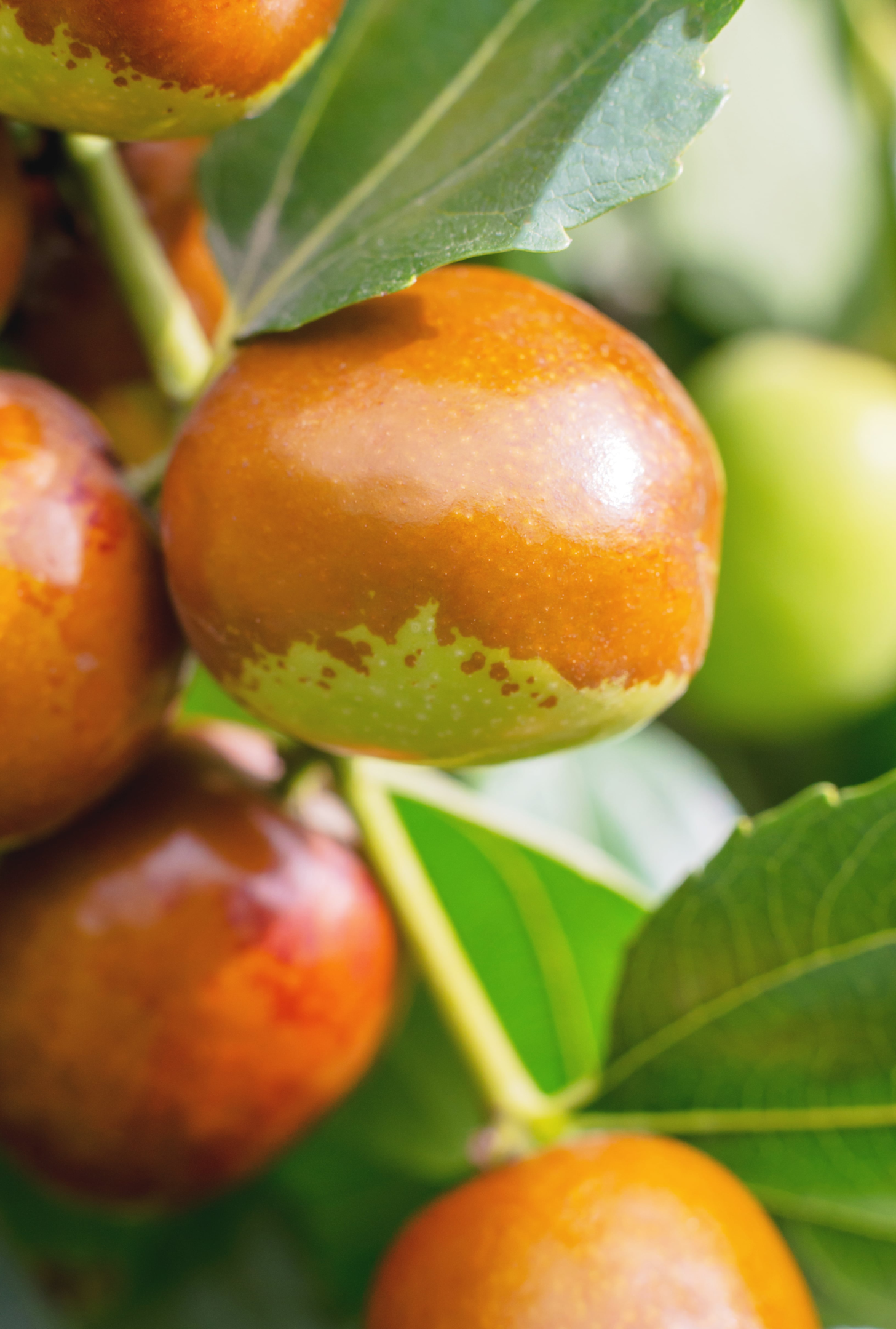
People throughout the history truly love naming jojoba oil in different funky names – it is also known as coffee berry, goat nut and wild hazel.
What are the Skin Benefits of Jojoba Oil?
Before getting into the benefits of Jojoba, we need to understand its chemistry. Jojoba oil is actually a wax. Wait, let me explain. jojoba oil is composed of almost 98% pure waxes. Most of the other plant oils are composed mainly of essential fatty acids.
Because it is actually a wax formula, it also lasts significantly longer than other natural oils. This makes it an incredible long lasting addition to any skincare. It can last upon 2 years. Other natural oils have around 6 months of shelf life.
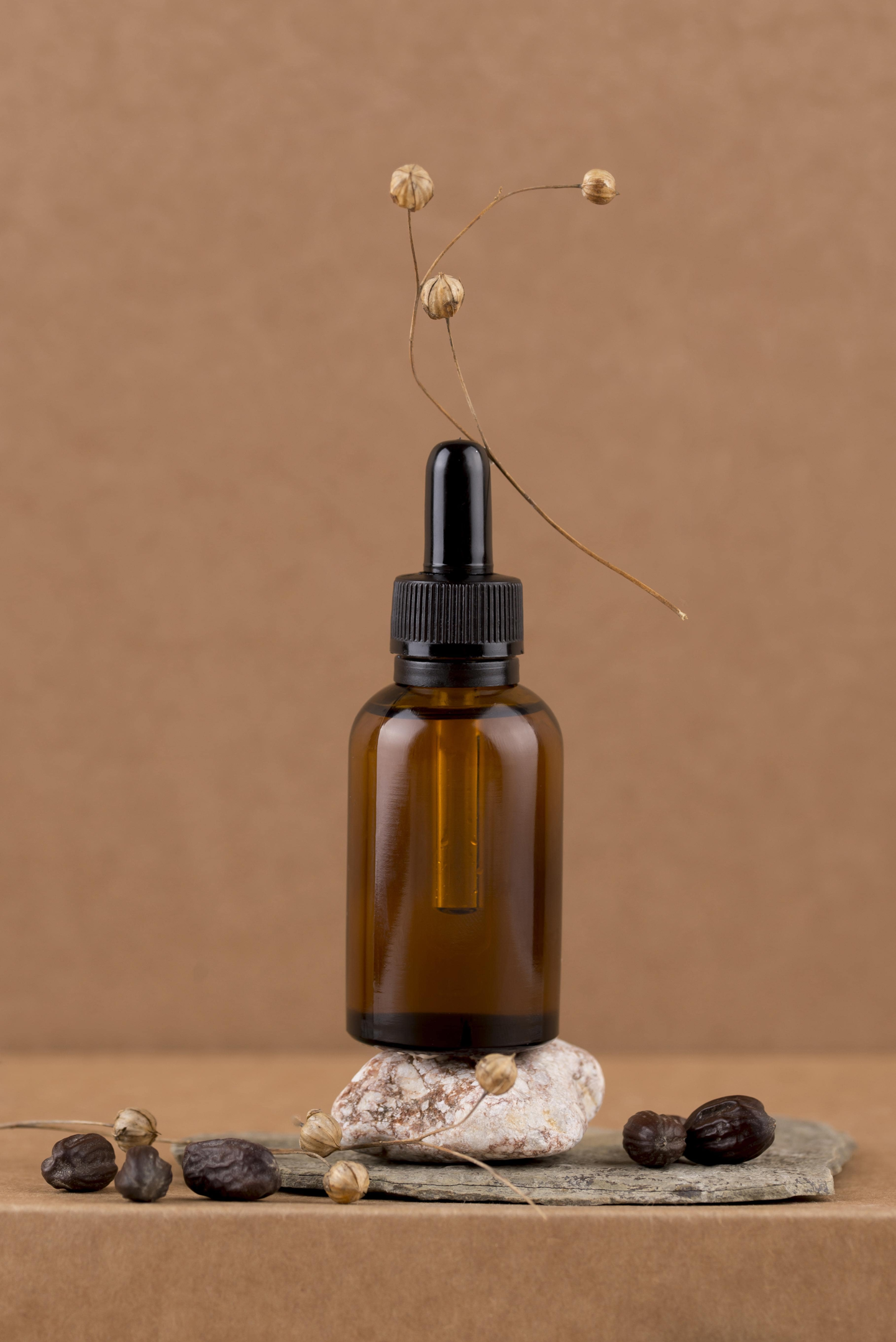
Anti-Acne Benefits and Sebum Regulation
Jojoba oil is pure gold for oily skin. It is a wax which has a very similar structure to the natural sebum that our skin produces. So science says that with a long term usage of jojoba oil, the wax replaces our sebum and this can signal our skin pores to produce less sebum. Less sebum production means less clog pores and less acne!
To support this idea, a study analysed a clay jojoba oil face masks effect on 133 participants for 6 weeks. It saw a significant decrease in pustules, papules and comodogens and participants also noted an increase in overall wellbeing and life quality.
Jojoba oils properties as a liquid wax can allow the dissolution of sebum deposits within hair follicles and clogged pores and can decrease the natural oil production of our skin. Jojoba oil can do that by the ability to penetrate the follicles and remove the comedome and hence clear out our skin. This makes jojoba oil really suitable for oily skin and acne prone skin.
Anti-Inflammatory Benefits
Inflammation is the natural deffense mechanism of the body but during the process of inflammation the healthy tissues might get damaged as well. Inflammatory skin conditions are such like psoriasis and atopic dermatitis.
Jojoba oil has been researched for its anti-inflammatory properties. One study demonstrated that jojoba oil significantly decreased the content of Prostaglandins E2 abbreviated as PGE2. From the site of inflammation in the tissues a component called arachidonic acid gets turned into PGE2. This conversion is mediated by enzymes with a funky name called COX-1 and COX-2.
It is though that that once the fatty acid content of jojoba oil is broken down those liberated fatty acids compete for the slots of the COX enzymes. If less COX enzymes can bind to arachindonic acid less PGE2 is produced, less PGE2 less inflammation. Bravo Jojoba Oil!
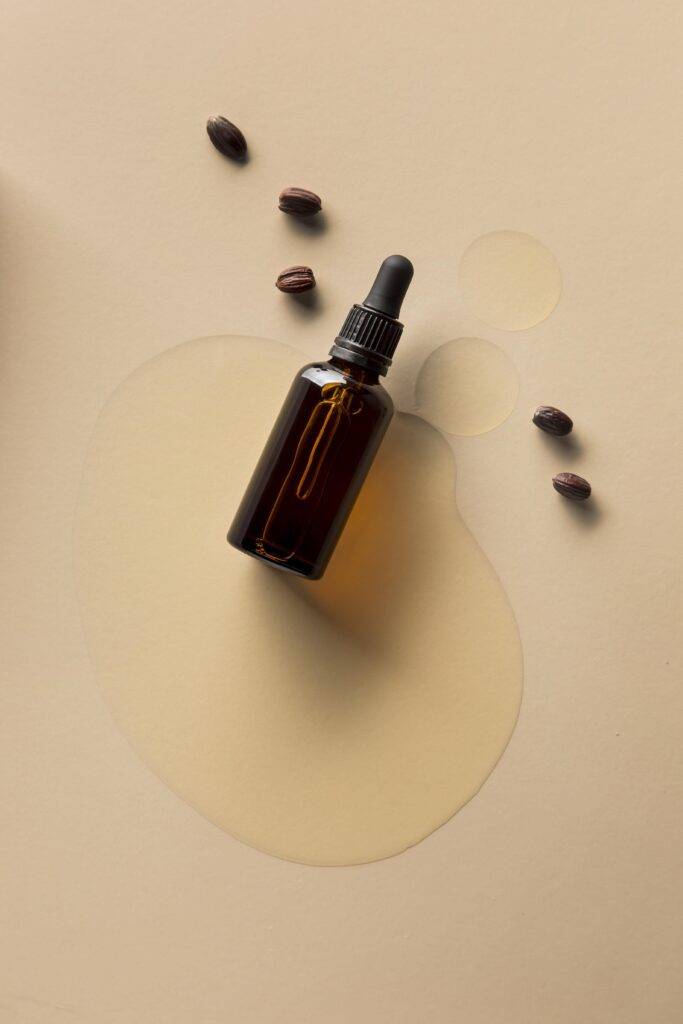
Skin Elasticity and Emollient Properties
Jojoba oil shows excellent hydrating and emollient properties and leaves no oily and greasy feeling
Jojoba oil has a structure which is similar to the structure our skin’s natural oil and it also has a high molecular weight. These characteristics create a smoothing effect on the skin and help contribute to better water control on our skin. By better water control it is meant that jojoba oil creates a surface on our skin which makes it hard for water to evaporate. This makes jojoba oil very suitable for dry skin and it decreases the excess flaking of epidermal cells.
Other researchers have also shown that after applying jojoba oil the suppleness and elasticity of the skin increased after 5 minutes and persisted for many hours.
Because jojoba oil has been proven to have such excellent emollient properties, researchers suggest using it with other natural oils to maintain the natural appearance of the skin.
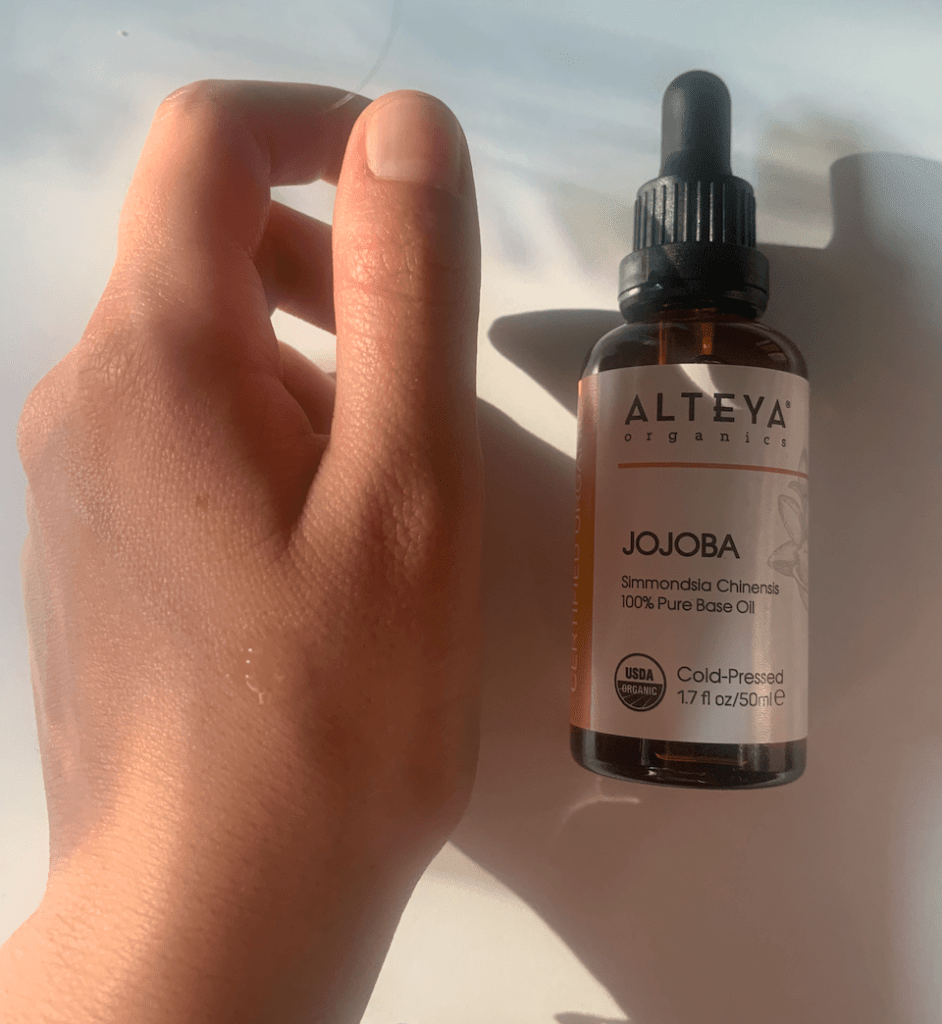
Wound Healing Properties of Jojoba Oil
It is estiamted that around 6 million people worldwide suffer from chronic wounds. This is an urgent clinical worry that requires a look into natural components as a remedy. Lucikly jojoba oil is here to help.
One study showed that jojoba oil had wound healing properties. This natural oil affects two of the main cells which regulate the healing process – fibroblasts and keratinocytes.
I actually did not know how to judge this information. As a medical student and future doctor I am excited to know that jojoba oil helps with wounds but as a skincare enthusiast I was more like – so unless you have a big scratch on your face, it cannot help much?!
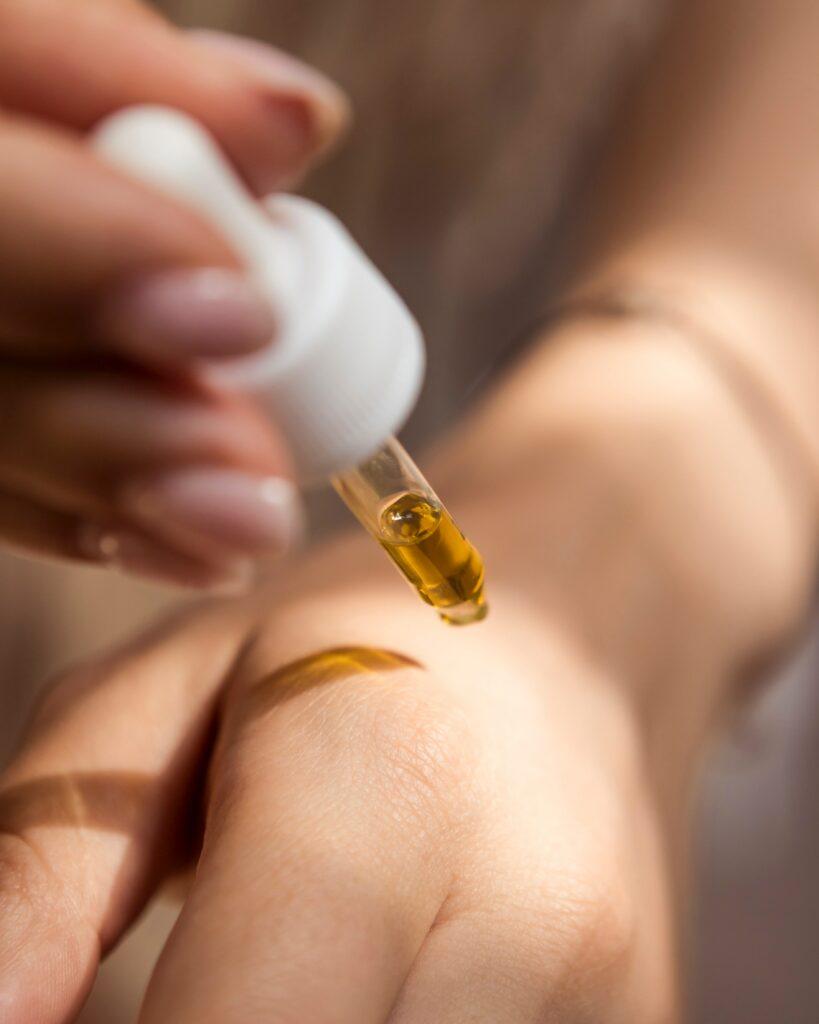
However, the fact that jojoba oil can promote wound healing means that it is NOT toxic to the body! On the contrary it helps the body repair itself. It gives a credibility to the safety of the oil!
Moreover if anywhere on your skin, not only your face, you have a scratch or deep wound, you can apply jojoba oil to give that tiny boost of remedy from the mother nature as well!
Antioxidant Properties – Hard to Implement into the Cosmetics
Jojoba Oil is very rich in Vitamin E or rather gamma-tocopherol which is the major form of vitamin E. According to science around 79% of the vitamin precursors in jojoba oil is vitamin E. This actually could make jojoba oil suitable for defence against the UV.
Jojoba oil actually is known for its antioxidant properties in the systemic diseases. It is rich phenolic compound which act to trap reactive oxygen species, the bad guys in most diseases. That is why it is suggested that jojoba oil can play a role in the treatment of conditions like asthma, inflammation and autoimmune diseases.
However, it is fair to be noted that there is no scientific paper analysing how effective jojoba oils anti-oxidant properties are on the skin cells. Vitamin E is effective in dermatology and skincare however we should expect some more scientific research on jojoba oil particularly. It is the best to take this information with a grain of salt! So I would suggest if you are after a natural oil with antioxidant power to use another oil – like rosehip seed oil. Read below for more details 🙂
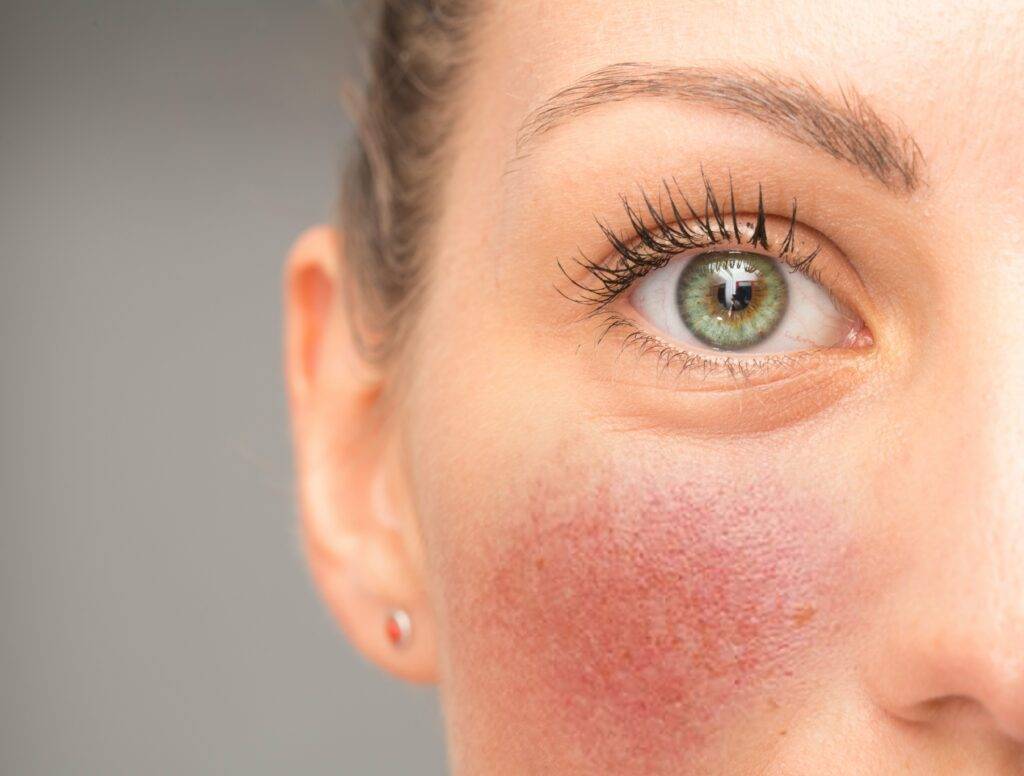
Anti-Microbial Properties of Jojoba Oil
Jojoba oil also has proven anti-microbial benefits against some very nasty bacteria lines like MRSA (methycylin resistant Streptococcus Aurelius), P. aeruginosa and more. This bacterias generally create some systemic infections like ear infection and skin rashes. However, I looked through the research to find if jojoba oil has antibacterial properties effective against the bacteria that causes acne. Unfortunately, there is no evidence that this natural oil can inhibit the bacteria that causes acne.
While we can celebrate the amazing antibacterial properties of jojoba oil, we should not expect it to be suitable for acne prone skin because of its anti-microbial properties, but rather it can be suitable because of its effects on the sebum production!
What is Argan Oil?
Last week was all about argan oil vs rosehip oil. Argan oil is an ancient medicinal plant used by the Moroccan women for the treatment of cystic acne, skin diseases and for general improvement of the skin.
It is native to Morocco, as you can guess, and it is a lightweight dry oil that does not leave any greasy feeling behind. It is packed with essential oils and vitamins and can help with a wide variety of skin conditions.
What are the Skin Benefits of Argan Oil?
Argan Oil is an ancient plant harvested from the argan tree. As a medical student I am always curious about the science behind those ancient medicinal herbs. Here I am going to cover the scientific reasons why argan oil is such a potent natural oil!
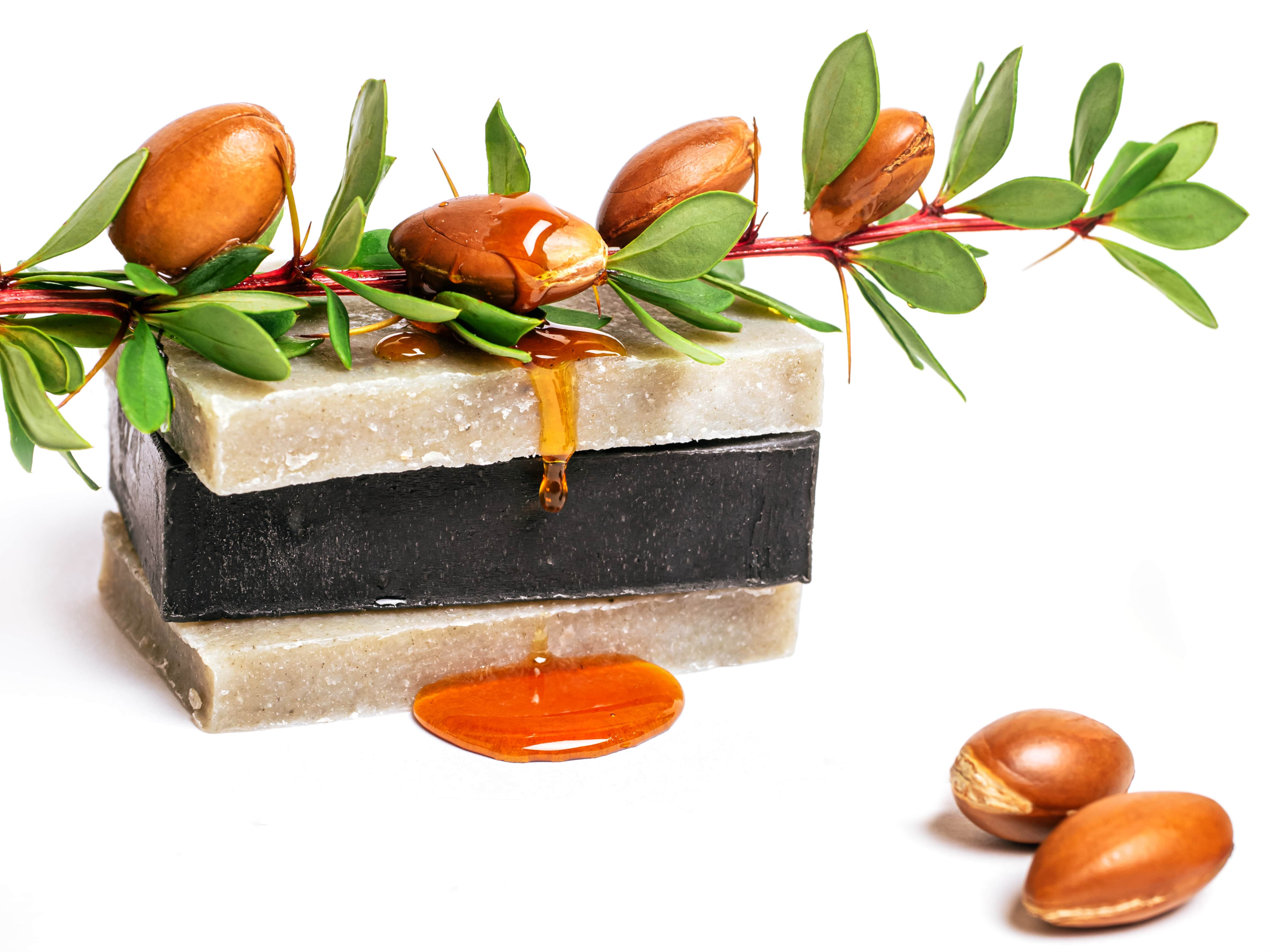
Anti-Acne Benefits and Sebum Regulation
Jojoba oil as mentioned above has great power on the sebum production and sebum regulation of our skin. But it is not only jojoba that has powers on our skin’s oil production and is beneficial for oily skin. Argan oil also effects these skin conditions but in a different mechanism.
Here is the science of argan oil and sebum production.
Researchers that have been wondering on the science behind it found it that it can inhibit 5α-reductase which is an enzyme located on our sebacious glands. This enzymes actually functions to convert testosterone into its more active form dihydrotestosterone.
This is though to be due to the essential fatty acids composition of this facial oil. Oleic acid, linoleic acid , γ-linolenic acid, and α-linolenic acid found in plant oils can inhibit both types 1 and 2 of 5α-reductase.
Back to skincare, by inhibits this enzyme argan oil can decrease the sebum production and make the skin less greasy. This can help with oily skin and acne prone skin as well and prevent breakouts!
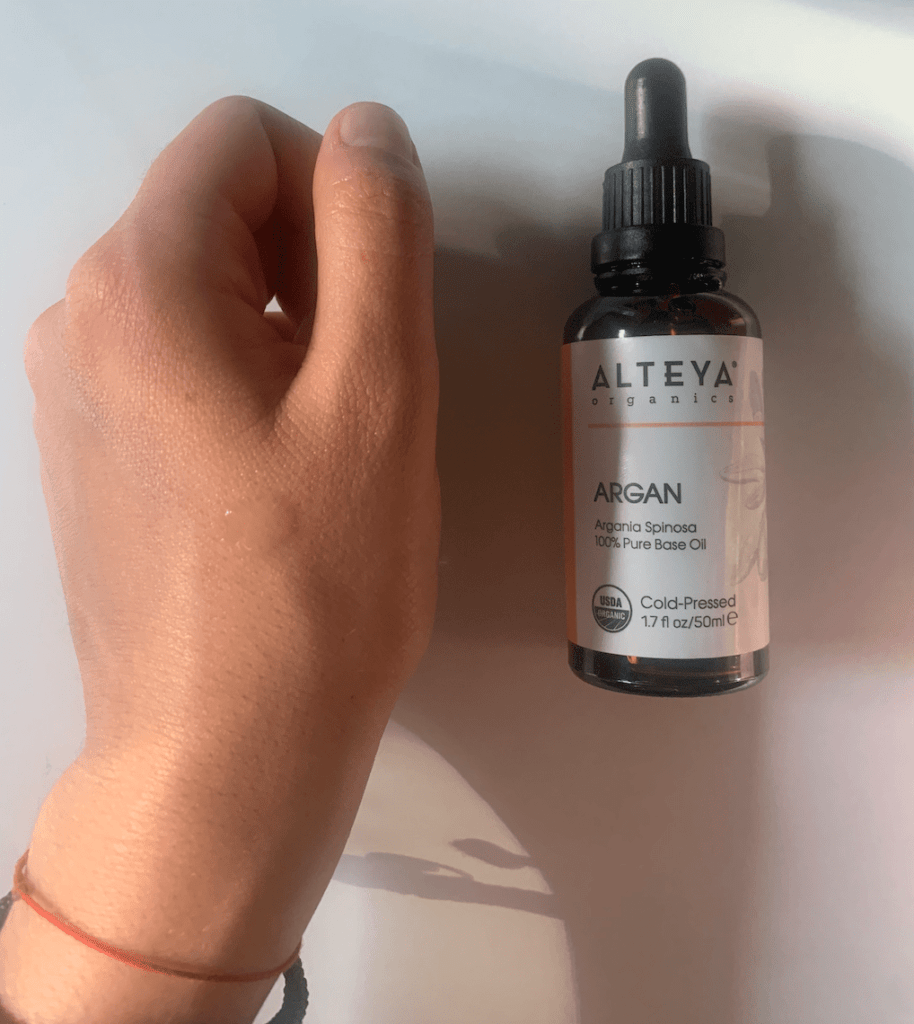
Skin Hydration and Skin Elasticity
Argan oil is abundant in essential fatty acids, specifically oleic acid, linoleic acid, and linolenic acid. These fatty acids play a vital role in maintaining the health of our skin cells and ensuring the proper functioning of the skin barrier.
When the skin barrier is compromised, micro cracks appear on the skin’s surface, allowing water to evaporate. This is known as trans epidermal water loss.
A study conducted on participants showed that after 60 days of using argan oil topically and orally, the facial oil effectively reduced trans epidermal water loss and enhanced the participants’ skin barrier. The scientific explanation lies in the rich content of linoleic acid found in argan oil.
Linoleic acid acts as a signal for the production of epidermal lipids, which serve as a binding agent to restore the skin barrier. The remarkable potency of linoleic acid in argan oil makes it a suitable choice for individuals with dry and dehydrated skin.
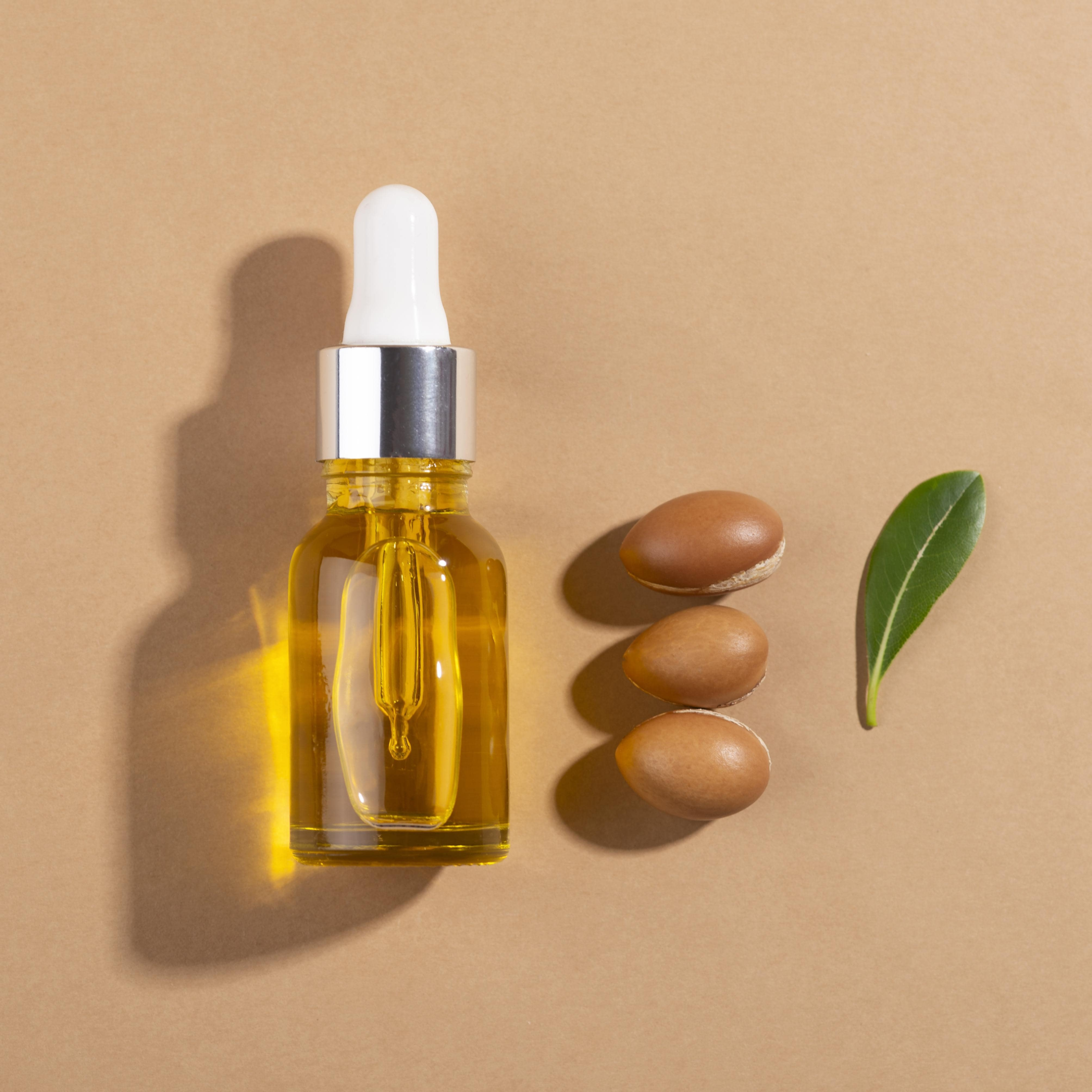
Stretch Marks
Argan Oil is very interesting becuase it has been researched specifically on the effects over the stretch marks. As we covered argan oil has a great ability to increase the skin elasticitiy and skin elasticity seems to be the vital thing to prevent stretch marks from forming.
When our dermis fails to produce enough intrinsic mechanical force we can observe stretch marks. Stretch marks are areas of different colour and texture on our skin. They can be depressed and can have different colours – reddish, white and even blue.
Stretch marks can occur after pregnancy, after weight changes, breastfeeding and due to endocrine dysfunctions. They would usually start as reddish longitudinal lines and then turn into white ones.
Scientists say that skin elasticity is of vital importance in treatment and prevention of stretch marks. In one study they looked at the effect argan oil would have on stretch marks and saw that it significantly increased the elasticity of our skin. Once the elasticity of our skin is restored this would eventually allow your skin to be flexed and extended more without some damage to it. Argan oil seems to be doing a great job at it and has proven scientific information.
What is Rosehip Oil?
Rosehip oil is extracted from the seeds of wild rose bushes native to Chile, Central Europe and Andes. It is a powerful botanical oil packed with vitamin C, unsaturated fatty acids like oleic acid, linoleic acid and linolenic acid and the magic ingredient tretinoin.
It is often confused the rose essential oils. If you are also confused make sure to check this blog over here – rose oil vs rosehip oil. It is also important to note that there are several kinds of rosehip oil and here is the quick comparison – Rosa Rubiginosa vs Rosa Canina.
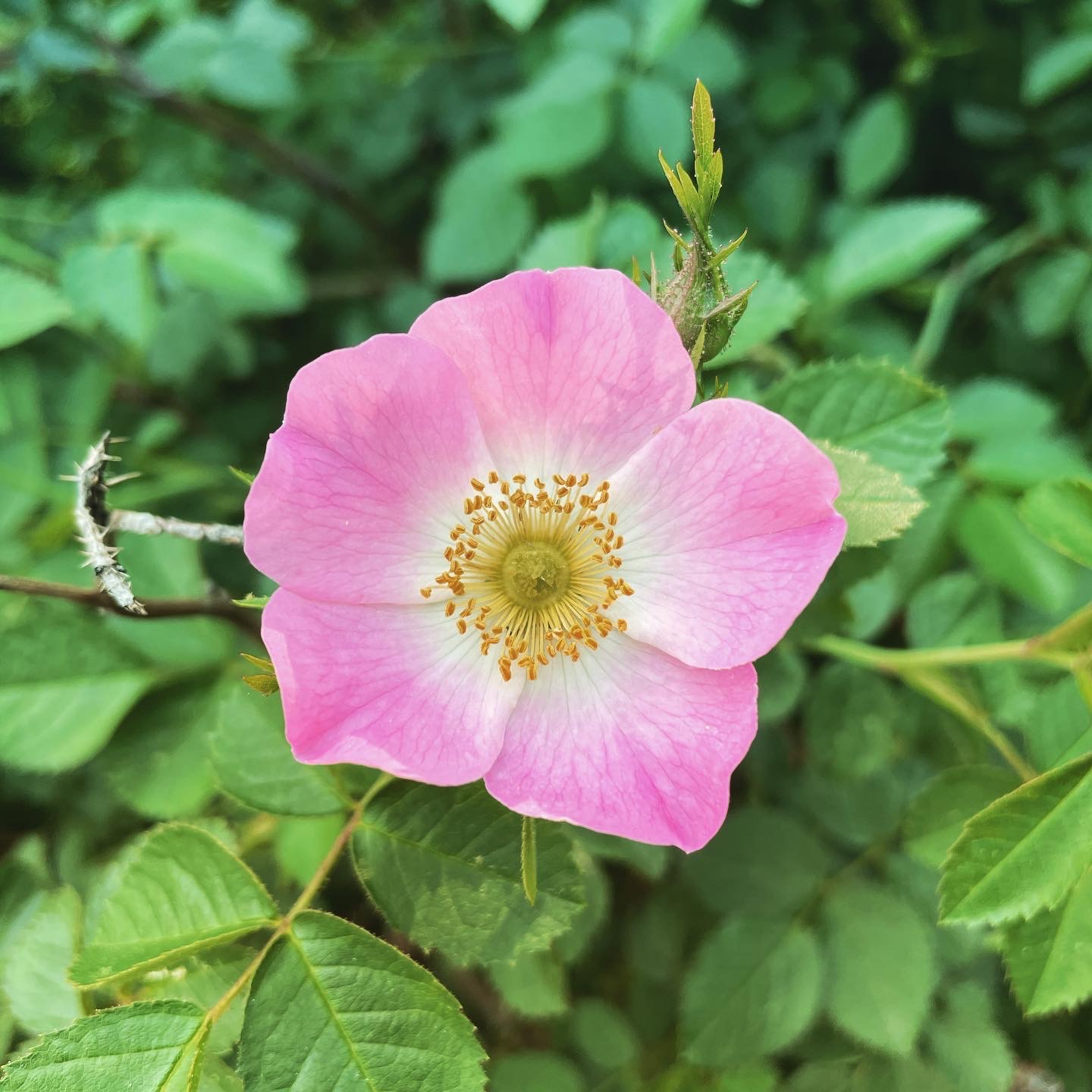
What are the Skin Benefits of Rosehip Oil?
Now that we have covered argan oil and jojoba oil and their benefits its time to address argan vs rosehip oil vs jojoba!
Rosehip oil is an incredible natural oil that has many beneficial components and any skin care routine can benefit from it. It is a dry oil and a carrier oil, meaning that once mixed with essential oils it can carry them into the deeper parts of our skin.
Anti-Inflammatory
Did you know that rosehip oil has some impressive anti-inflammatory properties? It has been shown to specifically target activated polymorphonuclear neutrophils, which are the troublemakers behind inflammation in our bodies. These cells jump into action when our tissues get damaged, creating an inflammatory environment to fight off any harmful pathogens. A little bit of inflammation is okay, but when it lingers for too long, it can actually cause more harm than good.
But here’s where rosehip seed oil comes to the rescue! Rosehip oil has the ability to reduce the migration of these cells, almost like blocking their path. This means that it has potent anti-inflammatory powers. And you know what’s responsible for this effect? It’s a component called galactolipin!
No wonder another study found that rosehip oil is really promising for people dealing with conditions like eczema, trophic ulcers, dermatitis, and chelitis. These inflamed and irritated skin conditions are all linked to excessive inflammation, so using rosehip oil can calm irritated skin and sensitive skin. It’s like giving your skin a soothing and calming treatment!
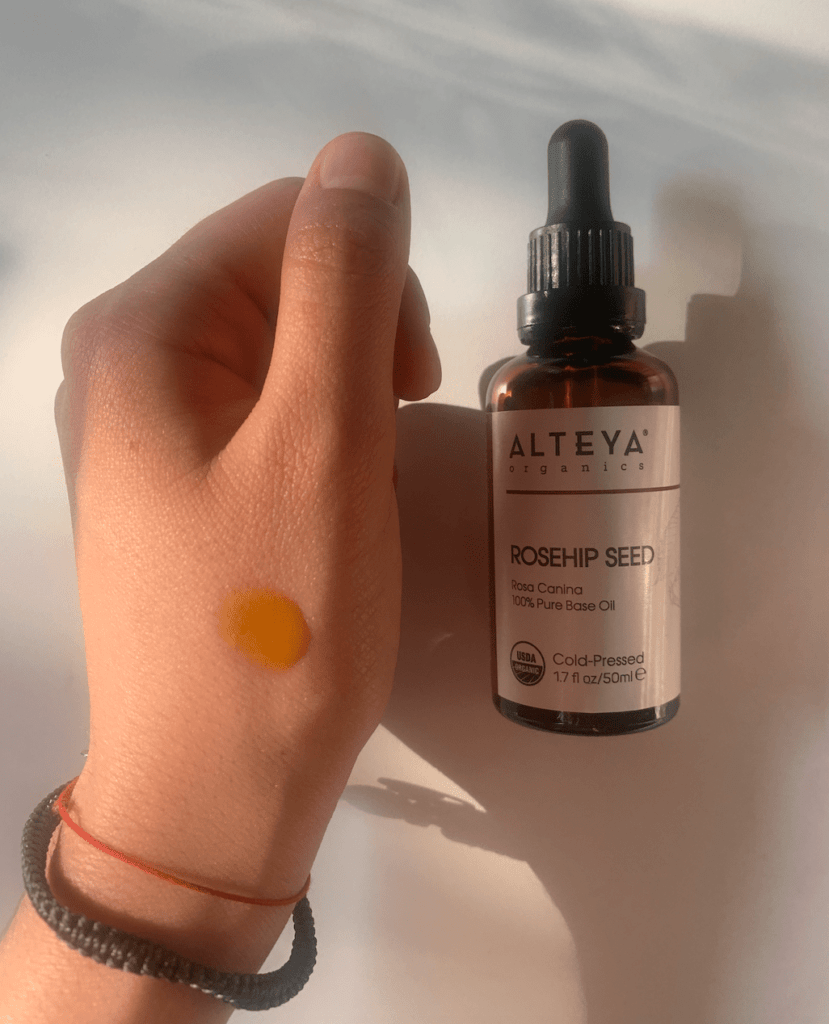
Antioxidant Properties and Hydration
Antioxidant properties – rosehip seed oil has been shown to have protective properties against reactive oxygen species causing by UV damage, environmental triggers and pollution. These are actually very effective anti aging properties and help to reduce free radical damage.
Moreover rosehip oil is really rich in vitamin c which helps with brightening the skin and creates a more even skin tone!
Jojoba and rosehip oil and argan oil are all packed with omega fatty acids such as oleic acid and linoleic acid, so they would form a film like barrier over the skin and help seal the hydration on the skin surface. This would really help to treat skin conditions such as dry skin.
Anti-Aging and Anti Acne
Rosehip oil has the magic ingredient tretinoin which is a vitamin A derivative. This component in higher doses is actually a medication prescribed by dermatologist to target adult acne that needs the anti aging boost.
Tretinoin and Vitamin A derivates can stimulate collagen production.
Collagen and elastin production are important components in treating aging skin and treating premature aging but rosehip oil has some more cool tricks in its sleeve.
Rosehip oil is like a superhero when it comes to boosting skin elasticity and reducing the appearance of wrinkles. How does it work? Well, it’s all thanks to the abundance of antioxidants packed into rosehip oil.
In a cool trial, volunteers were given oral rosehip powder for eight weeks, while another group received a powerful anti-aging antioxidant. And guess what happened? Both groups experienced some fantastic results! They noticed an improvement in skin elasticity, meaning their skin became more supple and resilient. Plus, those pesky wrinkles started to fade away, becoming less visible. Talk about a win!
Anti aging rosehip oil does not stop there as well, it is packed, really packed with vitamin c and vitamin e and they all work to reduce the free radical damage which helps with the aging skin!
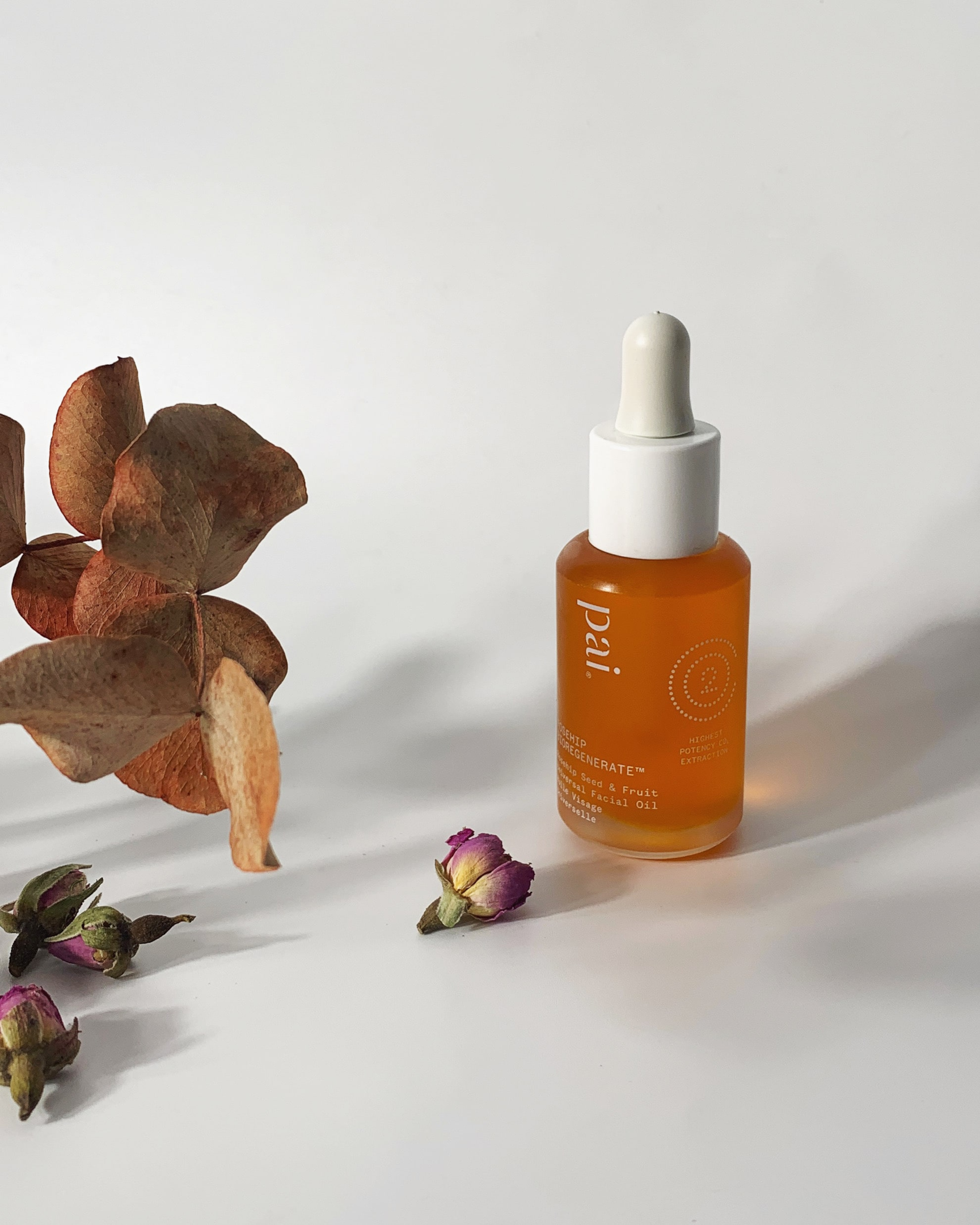
Argan Oil vs Jojoba Oil vs Rosehip Oil vs on Different Skin Types
Just like we covered in the post argan oil vs rosehip oil blog post I have to put a disclaimer here. There were no clinical studies comparing argan oil, rosehip oil and jojoba oil so the information on this section of the blog is made by me through the analysis of the composition of the facial oils.
| Argan Oil | Rosehip Oil | Jojoba Oil | |
|---|---|---|---|
| Skin Hydration | ✔︎ | ✔︎ | ✔︎ |
| Skin Elasticity | ✔︎ | ✔︎ | ✔︎ |
| Anti-Aging | ✔︎✔︎ | ||
| Anti-Acne | ✔︎ | ✔︎ | ✔︎✔︎ |
| Antioxidant | ✔︎✔︎ | ✔︎✔︎✔︎ | ✔︎ |
| Anti-Inflammatory | ✔︎ | ✔︎✔︎ | ✔︎✔︎ |
| Skin Barrier Repair | ✔︎ | ✔︎ | |
| Wound Healing | ✔︎ | ✔︎ | ✔︎ |
| Improves Stretch Marks | ✔︎ | ||
| Promotes Sebum Control | ✔︎✔︎ | ✔︎✔︎ | |
| Comodogenicity | 0 | 1 | 2 |
| Shelf Life | 6 months | 6 months | 2 years |
Which Oil is the Best for Acne Prone Skin?
I think this question would be the most debatable one. Considering their mechanism of action I think that all of them would help to sooth acne prone skin in some their own way. Let’s break it down why!
- Rosehip oil – has the ingredient tretinoin, vitamin A derivative, which is known for its anti acne benefits.
- Argan oil – decreases the sebum production by stopping the enzymes on our pores that promote sebum production
- Jojoba oil – has a structure that is very similar to skin’s own sebum so it can reduce the sebum production in the long run!
For skin types that suffer from acne as you can see all of the oils would give some sort of benefit. However, I need to note something here. Rosehip oil DOES contain tretinoin, that is undeniable, but the amount is low, so you would need to put a lot of rosehip oil on your skin to get the effect of prescribed tretinoin. This topic is extensively covered in the blog post here – rosehip oil and retinol.
However there are other benefits of rosehip oil. The Vitamin A in rosehip oil promotes a greater cellular turnover meaning cells can replace one another faster and collagen production. This can help the acne prone skin types with reducing the acne scars.
Having clarified this about rosehip oil, If you have acne prone skin using jojoba oil and argan oil together or separately could present benefits!
Which Oil is the Best for Oily Skin?
When it comes to oily skin I think it is pretty clear who the winner would be – argan and jojoba oil! Argan oil can decrease the sebum production and jojoba oil can also achieve this by mimicking skin’s natural sebum.
I have to admit I still have not tried mixing argan and jojoba oil together however keep an eye on this article for updates and reviews on the combination.
Rosehip oils are suitable for all skin types and for oily skin as well, but if you are after botanical oils which have a little more action on oily skin – argan oil and jojoba oil might be what you need.
Which Oil is the Best for Mature Skin?
The science behind the aging skin, I believe, needs its own lengthy article and as a medical student I am very excited to do this research. But for now, let’s cover argan or rosehip oil or jojoba oil is the best for mature skin.
Here is how I decided which oil is the best – I looked into the antioxidant properties, effects on collagen production and cellular turnover on the skin and the effects on these oils on skin elasticity. Here is the breakdown
- Rosehip Oil – Rosehip oil is rich in vitamin E and vitamin C which are potent antioxidants and help to fight off free radical damage and photodamage. They work better together and can prevent hyperpigmentation. Rosehip seed oil is also rich in vitamin A, derivative tretinoin which induces greater cellular turnover and collagen production. Roehip oil also has been shown in clinical trials to help to reduce wrinkles and boost skin elasticity. Voalla rosehip oil is great for mature skin types that need that extra boost.
- Jojoba Oil – jojoba oil is rich in Vitamin E that targets that photodamage.
- Argan Oil – argan oil is rich in Vitamin E which as mentioned above has that boost in antioxidants! Argan Oil has also been proven to increase skin elasticity this suggests that it can help with mature skin hydration and maintaining that elasticity!
Argan oil, jojoba and rosehip oil are all riich in Vitamin E and all give that extra hydration and potentiaally increase skin’s elasticity. However, argan and rosehip oils are tested in scientific studies with volunteers including people with mature skin types. In those studies these two oils have been shown to increase skin elasticity. This, in my opinion, makes argan oil and rosehip oil more suitable for aging skin.
However, when it comes to argan oil vs rosehip oil – I believe rosehip oil has the advantage. It has many vitamins and hydrating properties and it is considered a natural alternative of retinol!
For Mature skin Rosehip oil is the best option.
Which Oil is the Best for Dry Skin?
Argan oil, rosehip oil or jojoba oil on dry skin – which one is better? Actually I think this one is quiete easy. Dry and dehydrated skin types need more hydration and need more ways to lock already existing hydration.
These three oils are all packed with fatty acids such as oleic acid, linoleic acid and linolenic acid. They work by forming a barrier over the skin and preventing further water loss from the skin. It is important to note that you should moisturise BEFORE applying your face oil!
Argan oil and Rosehip and Jojoba oil are all suitable for dry skin.
Which Oil is the Best for Sensitive Skin?
Sensitive skin is a skin type that needs nourishment and soothing so a face oil with calming effects is the most suitable option.
Anti-inflammatory properties are the ones we should be looking for! When it comes to this the debate remains between rosehip oil vs jojoba oil!
Both oils have been shown to have anti-infammatory benefits. Moreover rosehip oil has been shown to be suitable and can help to treat inflammatory skin conditions! However when we look into the reviews of rosehip oil from brands like Pai Skincare which are designed for sensitive skin we can see the overwhelming good feedback!
Dry or sensitive skin rosehip oil can help with any skin condition!
For sensitive skin I would suggest using rosehip oil but keeping in mind that jojoba oil is also very well tolerated by skin type that is sensitive and sensitised.
Which Oil is the Best for Hair Treatment?
It would be a crime finishing this blog without mentioning the hair benefits of these oils especially argan oil and jojoba oil. For hair jojoba oil and argan oil can in promote hair growth and a healthy hair.
You can mix jojoba oil with olive oil, coconut oil and argan oil to create a natural and clean hair oil that gives a nice shiny hair!
Last Words on Argan Oil vs Jojoba Oil vs Rosehip Oil
Each of these oils deserve the titles of most famous botanical oils. We have covered a lot of topics and which one is best oil will remain on your own preferences and skin type. Without more details here is the last graph. Thank you so much for reading!
| Argan Oil | Rosehip Oil | Jojoba Oil | |
|---|---|---|---|
| Mature Skin | ✔︎ | ✔︎✔︎✔︎ | ✔︎✔︎ |
| Oily Skin | ✔︎✔︎✔︎ | ✔︎ | ✔︎✔︎✔︎ |
| Sensitive Skin | ✔︎✔︎ | ||
| Dry Skin | ✔︎ | ✔︎ | ✔︎ |
| Normal Skin | ✔︎ | ✔︎ | ✔︎ |

